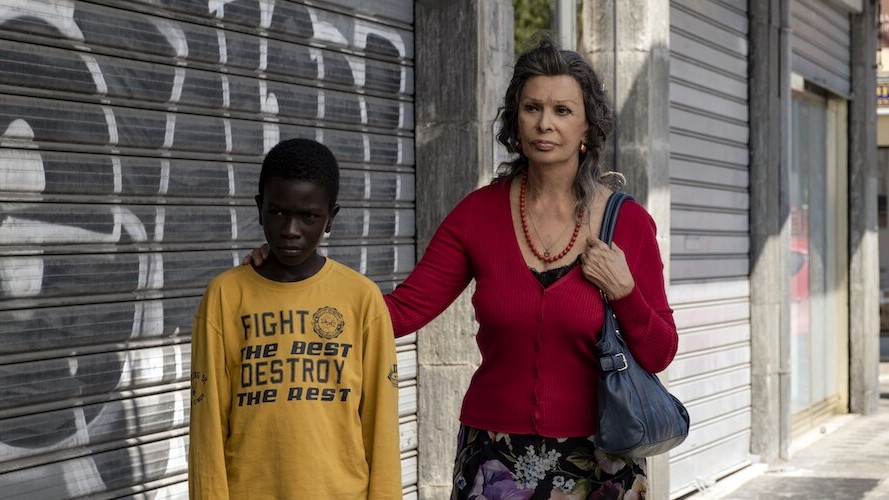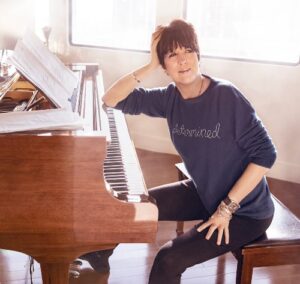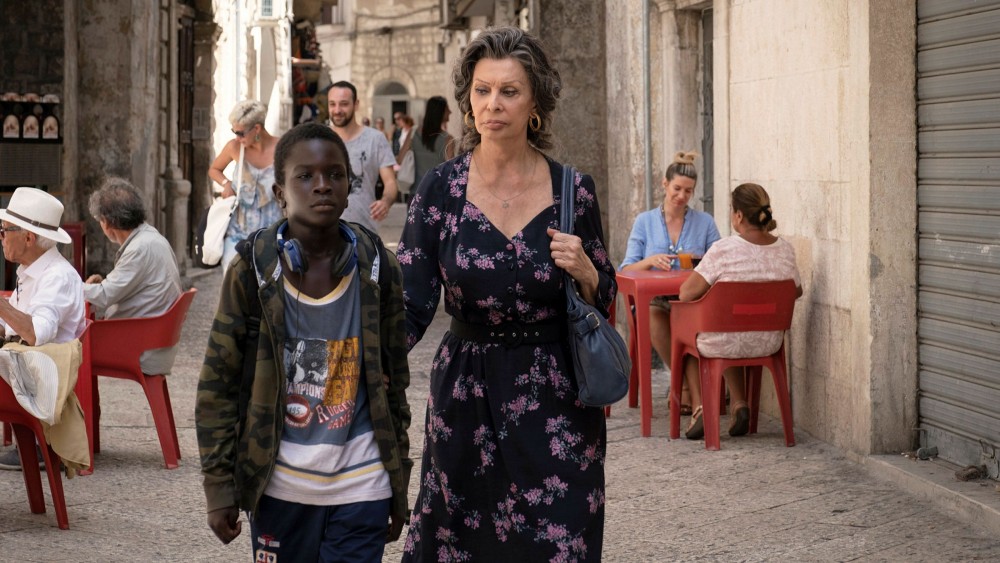
After 13 Oscar nominations with no wins, cinematographer Roger Deakins became a sort of Internet meme as one of our most popular, “always a bridesmaid” craftsmen. But what about American songwriting legend Diane Warren? Perhaps you have listened to some of the music she composed, including the Oscar nominated classic hits “I Don’t Want to Miss a Thing” and “Because You Loved Me.” Warren is now on her twelfth Oscar nomination without a single win, this time for the beautifully touching melody she composed for the Sophia Loren film, The Life Ahead, entitled “Io Si (Seen).” When your composing credits include the long list of timeless tunes that Warren has amassed, “overdue” is an understatement.
Nominated alongside Warren is Italian singer-songwriter Laura Pausini, a legend in her own right since the 1990s, at least in Europe and Latin America. Pausini has more than twelve albums to her credit, four Latin Grammys, and an Emmy nomination. Last month, she and Warren won the Golden Globe for “Io Si,” marking the first time an Italian song had triumphed in the Best Original Song category with the HFPA.
The film, directed by Loren’s son Edoardo Ponti, focuses on an elderly woman, Madame Rosa (Loren) who cares for orphans, including a refugee problem child called Momo (Ibrahima Gueye). Madame Rosa surrounds herself with outcasts and marginalized people, including a trans neighbor–fitting perhaps, since she was herself persecuted decades prior for being Jewish.
If there is any justice at the Oscars this year, Warren’s unlucky losing streak will be broken, and she and Pausini will lift up statuettes for composing one of the songs that is most moving and most apropos to its film this year. In the emotive “Io Si,” we listen to a woman promising to be there for people who are not usually seen, at the end of long struggles.
Read on for Below the Line’s interview with the Oscar-nominated duo last week.

Below the Line: Congrats on your Oscar nomination. Diane, you’ve been here before. How does it feel?
Diane Warren: It still feels more amazing–there is nothing more exciting. I was up the entire night before the nominations. I couldn’t wait. The Oscars–they pick five songs only and we are talking about a branch that has the most talented musicians–the best of the best composers and songwriters–on the planet. There are hundreds of songs in hundreds of movies and when you are chosen by them, it is very humbling and a real honor.
BTL: Laura how does it feel to have an Oscar nomination in general, and alongside this legend?
Laura Pausini: It’s the best way to live this experience. I’ve been a fan of Diane since birth, and I’ve always wanted to have a collaboration with her. Many years ago we tried and couldn’t find the right sound and voice for the song, and now we know why we had to wait this long. Because we like to do big things, both of us.
Warren: Go big or go home.
Pausini: This is more than big for me. I am so honored to live this experience with her.
BTL: Tell us about the collaboration process. How do you start writing the music for the songs you write? Do you see the movie first? At what point in the process do you get involved?
Warren: For this movie, I read the script first. The shooting hadn’t even started. The story was so emotional and beautiful and I kept seeing the word “seen.” These characters are not seen by the world and at first not even by each other. Madame Rosa is not seen by the world. She’s this old prostitute, and Momo is a street kid, and they are thrown together, and as time goes on, they finally see each other with their hearts, and then they are seen by the world, and it’s such a beautiful thing.
I actually broke my hand during the last Oscars season, but I sat down anyway to write the song. The melody almost wrote itself. Edoardo ended up using the song as Madame Rosa singing it to Momo, and in my mind, they were singing it to each other. I wrote it for all the people who are not seen in the world and right now we live in a time when we don’t even see each other.
I wrote the song but the movie, being in Italian, it did not work in English, and I remember wanting to work with Laura.
Pausini: That was more than 15 years ago, maybe 20.
Warren: Wow. Well I thought, “You know what, this is Sophia Loren, the best actress in Italy–we need the best singer in Italy.” This is the song to work with Laura. This melody needs a singer that can really carry it. Laura’s voice is one of the best in the world, and I don’t want to speak to her but I think she loved it.

BTL: How about you Laura–when did you get involved and what were you trying to say?
Pausini: I listened to the song after Diane wrote it. I was watching the filming of the movie, but it was not finished yet, but I could immediately understand the powerful message in the film, and I was in love with it.. Especially because it represents the way I want to educate my daughter. I wanted to listen to my voice being next to the characters. When I first listened to “Seen” I fell in love — I thought “a melody at another level.” For a singer it is frustrating sometimes to participate in songs that are not so deep or well-written.
I was scared not to be able to give the lyrics the same level of profound feeling that the melody had, the melting that it caused in me. I loved the title. “Seen” is a very short word that contains a world inside it — there is no word exactly in Italian (like in Spanish) that is as elegant in representing the meaning. So it took me almost 20 days to work on the Italian lyrics. I wanted to make Diane happy and also Edoardo.
Eventually, I wanted to say that it was about family, comprehension, being together, and not being separated. That was the collaboration and that was beautiful. That is why you have the lyric “Sto qui” or “I am here” in the English version. When I speak about being invisible, it’s supposed to be touching, because so many people feel like that, but being there for someone is a critical concept for the song and the movie.
Warren: Let’s start about how amazing the movie is and how stupendous Sophia is in it. And I got to go to Bari, Italy with music supervisor Bonnie Greenberg, and spent the day watching Edoardo working with Sophia. I was able to soak in the energy and the vibe of it — it was a very powerful scene towards the end of the movie. I don’t usually get a chance to do that, and that collaboration inspired me. It helped the creative process–I just took it in that day on the set. I can write something from reading a script, but that extra added experience helped tremendously.
Pausini: I met Sophia many times before working on this film, first through Edoardo in the early 2000s. They’re both very gentle, and he is so polite–something that can be difficult to find in men in these positions. I was inspired by them from the beginning when I met them–they live like simple people, in family, like you and I at home. Family was so important for them, and this movie was teaching everybody that you can have a family even if it’s not a blood family. It is a very modern concept, which is not necessarily an Italian concept, where family is typically mother and father.

I wanted this to be reality. We can all have a family even if our family is multi-racial, different ages, different experiences. You see a white old woman with a black young boy. It was so beautiful and that is what we discussed. Diversity is the light of life. Without it, we are bored.
I admired so much that Sophia wanted to express, by the way once again in her career, the image of a woman who takes care of refugees. This is why she is an icon. Not just because of her talent, but because she takes on these roles that speak to people who are conservative and she is not afraid of sending that message.
BTL: Where do you get your inspiration from, over the course of your career?
Warren: Honestly I have no idea–a bit of everything. Other artists, the experience of my life, and I guess some talent to do it. I always am open to inspiration and have my antennas up. I like to put in the work but I also like to be inspired by something compelling with a powerful message to translate that into a song. And some of the timely topics like immigrants and transgender characters–these are people who are not always seen for who they are–inspired me. I was very aware of those themes and I want a song to exist outside of the movie itself. That is how I typically approach it. And the fact that the pandemic came gave it another meaning–everyone became invisible. It felt powerful for the moment.
BTL: If the audience was going to take away one thing from your song, what would you want it to be?
Warren: That you are seen and not invisible, but you must be seen through your heart.
Pausini: There is always a reason to live. There is no reason to let your life behind you crush you down.
BTL: Best of luck with the Oscars, Diane! We hope you finally end that streak!
Warren: There would be no better moment to do it, doing it with Laura would be so amazing. When we won the Globe it was the first time a song not in English won, so that would be extra cool, too, because I don’t know if an Italian one has won at the Oscar. I [expletive] hope this is the first one!
Pausini: [Laughing] I researched it, and it’s the first time a female duo won at the Globes in this way, and for an Italian song.
Warren: How cool is that?
The Life Ahead is available to stream on Netflix, and you can watch the music video for the Oscar-nominated song “Io Si (Seen),” with verses in English and Italian, below:
Movie stills courtesy of Netflix.





